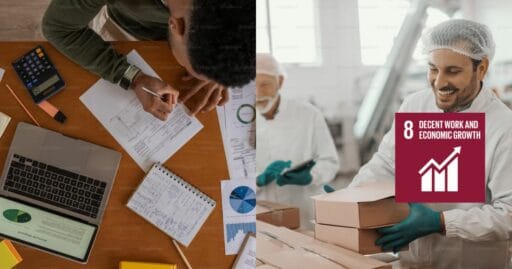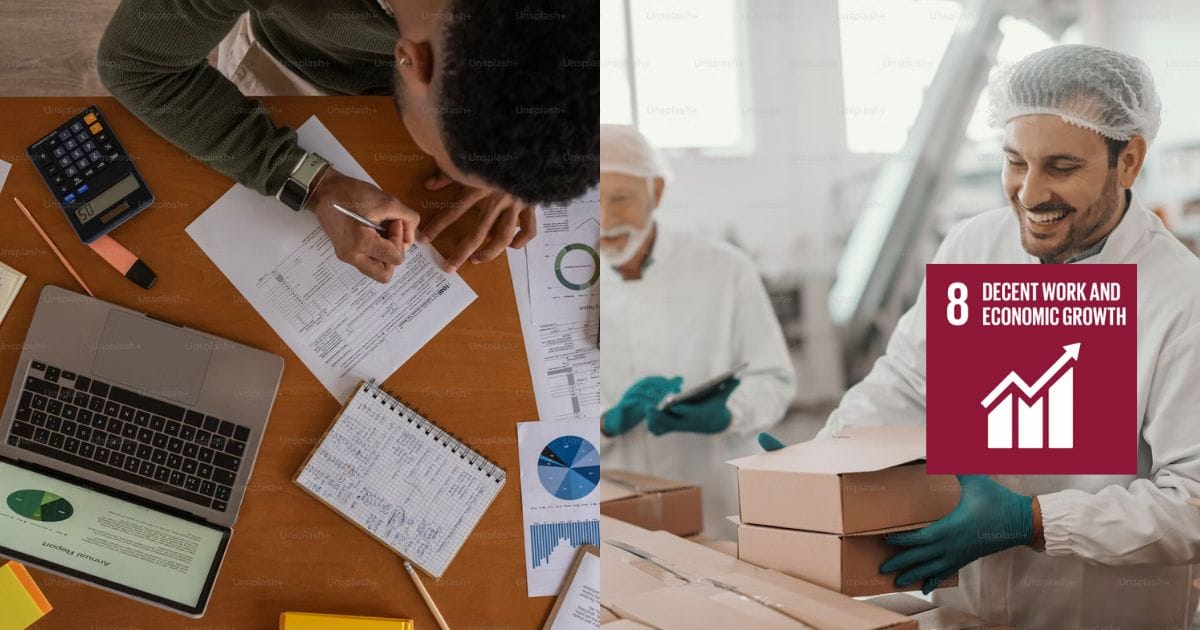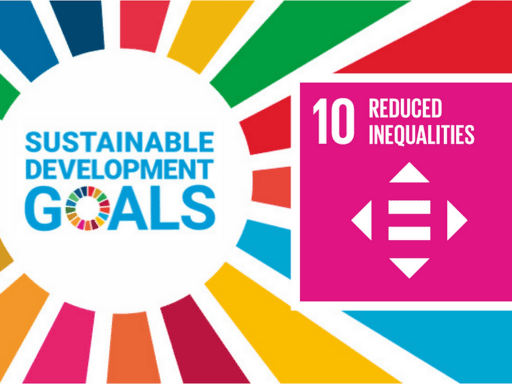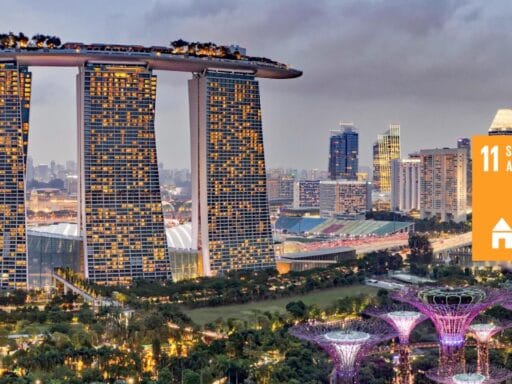SDG Goal 8, known as Decent Work and Economic Growth, is critical to establishing an inclusive and sustainable society. This objective aims to accelerate growth, decrease poverty, and improve global development by prioritizing productive work, fair pay, labor rights, and economic stability. To achieve SDG Goal 8, governments, companies, and civil society must work together strategically to create fair, just, and economically viable communities.
SDG 8 is also strongly related to promoting innovation, enhancing productivity, and supporting sustainable economic practices. This objective aims to guarantee that economic growth has a good social impact for all residents by focusing on economic structures that promote inclusive labor market reforms and adequate work opportunities. Furthermore, it focuses on minimizing informal employment, empowering women and youth, and providing access to social safeguards, so establishing a framework in which both people and companies may prosper within resilient economies. This multifaceted approach emphasizes that sustainable development is about more than simply economic growth; it is also about establishing more equitable societies that value human dignity and long-term well-being.
The Importance of SDG Goal 8
Sustainable economic growth drives societal prosperity, whereas decent employment guarantees that employees are empowered, respected, and protected in their job. For poor countries, SDG Goal 8 encourages economic change, skill development, and youth involvement. In industrialized economies, it targets underemployment, wage inequality, and job safety. Achieving inclusive economic growth is important for:
Reducing Inequalities: Economic growth can help decrease income differences within and across nations, hence improving overall social cohesiveness.
Job Creation: New jobs boost financial stability and general quality of life, particularly for excluded communities.
Social Justice: Decent employment guarantees ethical treatment, labor rights protection, and fair pay.
History and Evolution of SDG Goal 8
The vision of SDG Goal 8 is based on long-standing efforts to tackle poverty and economic inequality, which date back to the Millennium Development Goals. While the MDGs were primarily concerned with poverty reduction, the 2030 Agenda for Sustainable Development broadened the scope to include the development of sustainable jobs and inclusive growth. This shift emphasizes the need of fair economic success for all members of society, ensuring that no one falls behind.
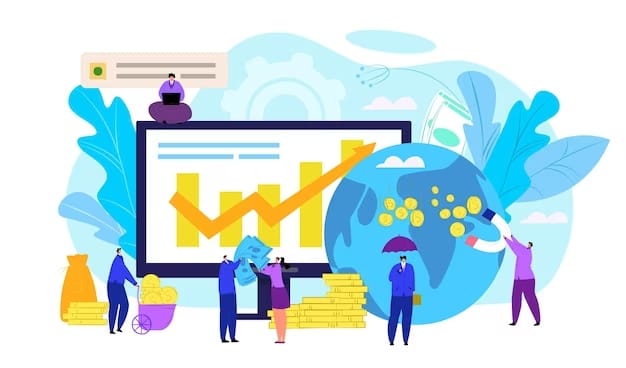
Key Targets and Indicators
- Sustainable economic growth
Encourage the least developed nations to raise their GDP by at least 7% each year. This goal strives to stimulate robust economic growth in areas that require it the most. - Productivity and Diversity
Promote policies that encourage economic diversity, entrepreneurship, and the expansion of high-value sectors, resulting in more inventive and resilient economies. - Full Employment and Decent Work
Achieve full employment, including decent jobs for all women, men, and youth. This includes equal compensation for equal effort, as well as possibilities for economic progress. - Labor Rights Protection
Ensure that labor rights are protected, workplaces are safe, and exploitative practices such as child labor, forced labor, and human trafficking are eliminated. - Financial Inclusion
Increase access to financial services including banking, insurance, and credit, especially for underrepresented groups, small businesses, and women.
Challenges in Achieving SDG Goal 8
Economic Inequality
Income disparities, employment possibilities, and access to education all pose challenges to finding good work and attaining economic growth. Reduced pay disparities and fair opportunity for marginalized groups are critical.
Youth Unemployment
Youth are three times more likely than adults to be unemployed, and many have limited access to suitable training and work prospects. To close this gap, governments and companies must invest in skill development, apprenticeships, and educational initiatives.
Precarious Working c\Conditions
Many workers globally, particularly in informal economies, confront hazardous, low-paying, and insecure working conditions. Labor laws, enforcement procedures, and workplace safeguards can be strengthened to guarantee that everyone receives equitable treatment.
Gender Disparities
Women frequently suffer uneven employment opportunities, low earnings, and workplace discrimination. Addressing gender disparity through policies like equal pay, maternity leave, and anti-discrimination measures is critical to achieving SDG Goal 8.
Economic Shocks
The COVID-19 pandemic demonstrated how abrupt crises may destabilize economies, raise unemployment, and expose gaps in social safety nets. Building robust economic systems that can survive global shocks is critical.
Practical Strategies to Advance SDG Goal 8
- Support Small and Medium Enterprises (SMEs)
SMEs are key drivers of job creation and innovation. Governments can offer incentives, grants, and training to help SMEs thrive and employ more people. - Promote Vocational Training
Providing accessible, high-quality vocational training aligns worker skills with market demands, reducing unemployment and improving job satisfaction. - Adopt Fair Wage Policies
Implementing living wage laws ensures workers earn sufficient income to support themselves and their families. - Encourage Gender Diversity in Leadership
Promoting women’s participation in leadership positions fosters inclusive decision-making, broadening perspectives and improving organizational performance. - Enforce Labor Rights
Governments and businesses should work together to protect workers’ rights, prevent workplace exploitation, and create safe and inclusive environments.
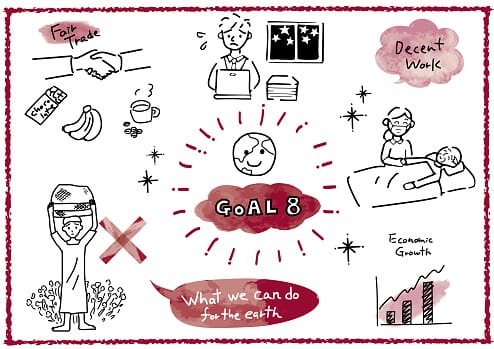
Case Studies
Germany’s Dual Vocational System
Germany’s dual vocational system is internationally acknowledged as a model for connecting education and work. This strategy, which combines classroom education with hands-on training at collaborating firms, provides young people with market-relevant skills. Graduates benefit from high employability, employment security, and competitive pay. Germany’s strategy has dramatically decreased young unemployment, providing a model for other countries looking to establish acceptable job prospects.
Rwanda’s Economic Reforms
Rwanda has revolutionized its economy via business-friendly policies that promote entrepreneurship and innovation. Through government changes, the Government has created a favorable investment climate, streamlined corporate registration procedures, and expanded infrastructure. These programs have boosted economic development, decreased poverty, and created more job possibilities, particularly for women and youth.
Morocco’s Green Economy Initiatives
Morocco has prioritized clean energy and long-term economic prosperity with its ambitious renewable energy plans. The country’s efforts in solar and wind power have resulted in thousands of new employment while also boosting environmental sustainability. Morocco highlights how green sectors may help achieve SDG Goal 8 while reducing climate change by combining economic growth and environmental responsibility.
FAQs
1. Why is SDG Goal 8 important?
SDG Goal 8 focuses on economic growth, job creation, and decent work opportunities, which are essential for reducing poverty, improving quality of life, and achieving social equity.
2. How can businesses support SDG Goal 8?
Businesses can contribute by implementing fair labor practices, offering training programs, promoting gender diversity, and investing in sustainable industries.
3. What is decent work?
Decent work involves fair wages, safe working conditions, respect for labor rights, and opportunities for career growth.
4. How does economic growth benefit society?
Economic growth stimulates development, improves living standards, increases job opportunities, and enhances access to education and healthcare.
5. How can governments foster economic growth?
Governments can implement policies that promote entrepreneurship, reduce regulatory barriers, invest in infrastructure, and support social protection programs.
Achieving SDG Goal 8: Decent Work and Economic Growth is critical to creating an inclusive, sustainable future. We can establish societies in which everyone has the chance to prosper by encouraging decent employment, decreasing inequities, and ensuring economic stability. Governments, corporations, and civil society must work together to guarantee that economic opportunities are available, worker rights are protected, and economic progress benefits everyone.


